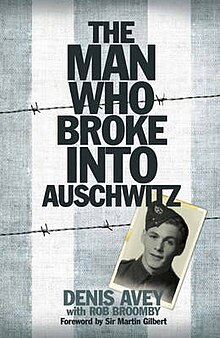The Man Who Broke into Auschwitz: Difference between revisions
Undid revision 650621724 by KoshVorlon (talk) -we have an entire section on this |
Sceptic1954 (talk | contribs) 'Purported' superfluous. Being autobiographical doesn't necessarily mean it is 100% accurate. He received the award before the book was written. |
||
| Line 1: | Line 1: | ||
[[File:Avey cover English.jpg|right|220px]] |
[[File:Avey cover English.jpg|right|220px]] |
||
{{Italic title}} |
{{Italic title}} |
||
'''''The Man Who Broke Into Auschwitz''''' is the title of |
'''''The Man Who Broke Into Auschwitz''''' is the title of an autobiographical book by [[Denis Avey]], who is a recipient of a [[British Hero of the Holocaust]] award. The book was written together with Rob Broomby and published by [[Hodder & Stoughton|Hodder]] in 2011.<ref name="hodder">[https://web.archive.org/web/20120524061459/http://www.hodder.co.uk/news_events/news.aspx?ArticleID=344 Hodder & Stoughton > News and events.]</ref> It carries a foreword by [[Sir Martin Gilbert]]. The novelist James Long assisted with research and helped to edit and structure the manuscript. However, since its publication, the book has become a subject of considerable controversy. The head historian at Auschwitz, [[Piotr Setkiewicz]], who conducted his own research,<ref name=Walters_Mail/> which was confirmed by other historians, Auschwitz former prisoners, and Jewish organisations, came to the conclusion that at least some parts of the story seem highly unlikely and probably never happened.<ref name=Walters_Mail/> |
||
==Book synopsis== |
==Book synopsis== |
||
Revision as of 07:33, 26 March 2015

The Man Who Broke Into Auschwitz is the title of an autobiographical book by Denis Avey, who is a recipient of a British Hero of the Holocaust award. The book was written together with Rob Broomby and published by Hodder in 2011.[1] It carries a foreword by Sir Martin Gilbert. The novelist James Long assisted with research and helped to edit and structure the manuscript. However, since its publication, the book has become a subject of considerable controversy. The head historian at Auschwitz, Piotr Setkiewicz, who conducted his own research,[2] which was confirmed by other historians, Auschwitz former prisoners, and Jewish organisations, came to the conclusion that at least some parts of the story seem highly unlikely and probably never happened.[2]
Book synopsis
Denis Avey relates his wartime service and how he came to be held prisoner in E715A, a camp for Allied Prisoners of War adjacent to Monowitz. He describes how he exchanged uniforms with a Jewish inmate of Auschwitz III in order to enter this camp to discover more about conditions there, with a view to reporting these to the authorities after the war.[3] He also relates how he smuggled cigarettes to another Jewish inmate Ernst Lobethal, having obtained these from Lobethal’s sister in Britain. He was convinced that Ernst had died by early 1945, because he could not have survived the death marches when the camp was evacuated. He also said that after the war the authorities were not interested in his story and he kept silence for more than half a century. Eventually he did begin to disclose his story and it came to the attention of the BBC. Rob Broomby was able to trace Lobethal’s sister Susanne and her son had a copy of a video recording which her brother before his death had made for the USC Shoah Foundation Institute for Visual History and Education in which he describes how a British POW known as 'Ginger' smuggled the cigarettes to him and how these saved his life by enabling him to exchange them for food and to have new soles put on his boots which enabled him to survive the death march.
Controversy
The World Jewish Congress asked the publisher to have the book verified.[4] Questions have also been raised by British writer, Guy Walters, as to whether Avey actually managed to 'smuggle himself' into Auschwitz. Walters pointed out that some time earlier Charles Coward also claimed to have smuggled himself into Auschwitz III by means of an exchange, and that this was the subject of a book titled The Password is Courage where Coward was billed on the back cover as 'The Man who Broke into Auschwitz'.[2] For the paperback edition of Avey's book the publishers issued 'notes on sources' by Broomby and Long, responding to some of the questions raised, available on the publisher's website.[1] However, Avey's application for the "Righteous Among the Nations" award was turned down by Yad Vashem because his story could not be substantiated. Dr. Piotr Setkiewicz, head of research at the Auschwitz-Birkenau Museum told Reuters that he does not think the swap described in the book ever happened. Setkiewicz added that Avey's description of Auschwitz III does not conform to known facts about it, beginning with the "Arbeit Macht Frei" sign upon its entrance, which almost certainly did not exist.[4]
See also
- Angel at the Fence memoir written by Herman Rosenblat
References
- ^ a b Hodder & Stoughton > News and events.
- ^ a b c Cite error: The named reference
Walters_Mailwas invoked but never defined (see the help page). - ^ "The Man Who Broke into Auschwitz: A True Story of World War II", Publisher's Weekly, book summary
- ^ a b Reuters (5 March 2011). "Veteran defends Auschwitz heroics story". Jewish groups, former concentration camp inmates say they have serious misgivings over some parts of Denis Avey's book about his time as prisoner in nearby labor camp in Nazi-occupied Poland. Israel Jewish Scene, Ynetnews. Retrieved 6 March 2015.
{{cite web}}:|author=has generic name (help)
